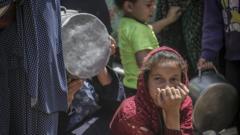In a grim assessment of the humanitarian crisis in Gaza, the head of the UN refugee agency has emphasized that the denial of food and humanitarian assistance is a "weapon of war." This stark declaration comes as displacement and suffering worsen amid Israel's renewed military offensives, which resumed on March 18 after a prolonged ceasefire. International journalist accounts note that local reporters in Gaza are risking their lives to document the rapid deterioration of living conditions, with over 200 of them having been killed in conflict zones.
Pascal Hundt of the International Committee of the Red Cross highlighted the daily struggle for survival faced by civilians, indicating an urgent need for humanitarian assistance that is currently blocked by Israel. The recent escalation has further intensified these struggles, with Israel's military actions effectively sealing off Gaza. This blockade has resulted in the disruption of all shipments, including essential food and medical supplies.
As the conflict continues, Prime Minister Benjamin Netanyahu's government faces mounting criticism for prioritizing military actions over humanitarian considerations. This reality is compounded by hardline factions that oppose any peace efforts, seemingly intent on displacing the Palestinian population in favor of Jewish settlers.
Philippe Lazzarini, the commissioner-general of the UN Relief and Works Agency (UNRWA), expressed profound concern over the worsening conditions, revealing that Gaza residents have been without significant aid for over two months. He warned that beyond the immediate threat of military violence, starvation is claiming lives. The "weaponization of humanitarian aid" has been starkly evident, with starvation indicators climbing among the population. Current estimates indicate that over two million residents, including many children, are on the brink of famine.
A recent report by the Integrated Food Security Phase Classification (IPC) identified Gaza as being near a state of famine, noting that about 22% of the population faces extreme food shortages, while over 470,000 individuals struggle for basic sustenance. Despite evidence collocated from various humanitarian organizations, Israeli officials have claimed that Hamas manipulates food distribution efforts.
In a direct challenge to these accusations, Lazzarini maintained that recent investigations by UNRWA did not support Israeli claims of organizational infiltration. Instead, he pointed out that blocking aid is being used as a strategic tool to exert pressure in the ongoing hostilities. Elevated tensions continue to ripple through Israeli society, as the plans for further military offensives draw ire from various political figures and military reservists, who question the motives behind protracted military actions.
The international response to the crisis has been tepid, prompting humanitarian leaders to warn of historical consequences should current patterns persist. The potential for genocide has been framed within these discussions, as legal and ethical implications come to the fore, including considerations for accountability through bodies like the International Criminal Court (ICC).
Meanwhile, a growing chorus of global voices, including those of allied states, has begun advocating for the urgent resumption of humanitarian aid to Gaza, pressing for an end to tactics that undermine civilian safety. As the situation escalates, Lazzarini’s call to action reverberates with the sentiment that historical inertia is propelling disasters on a tragic scale—one that, if left unchecked, could redefine long-term prospects for peace in the region.
Pascal Hundt of the International Committee of the Red Cross highlighted the daily struggle for survival faced by civilians, indicating an urgent need for humanitarian assistance that is currently blocked by Israel. The recent escalation has further intensified these struggles, with Israel's military actions effectively sealing off Gaza. This blockade has resulted in the disruption of all shipments, including essential food and medical supplies.
As the conflict continues, Prime Minister Benjamin Netanyahu's government faces mounting criticism for prioritizing military actions over humanitarian considerations. This reality is compounded by hardline factions that oppose any peace efforts, seemingly intent on displacing the Palestinian population in favor of Jewish settlers.
Philippe Lazzarini, the commissioner-general of the UN Relief and Works Agency (UNRWA), expressed profound concern over the worsening conditions, revealing that Gaza residents have been without significant aid for over two months. He warned that beyond the immediate threat of military violence, starvation is claiming lives. The "weaponization of humanitarian aid" has been starkly evident, with starvation indicators climbing among the population. Current estimates indicate that over two million residents, including many children, are on the brink of famine.
A recent report by the Integrated Food Security Phase Classification (IPC) identified Gaza as being near a state of famine, noting that about 22% of the population faces extreme food shortages, while over 470,000 individuals struggle for basic sustenance. Despite evidence collocated from various humanitarian organizations, Israeli officials have claimed that Hamas manipulates food distribution efforts.
In a direct challenge to these accusations, Lazzarini maintained that recent investigations by UNRWA did not support Israeli claims of organizational infiltration. Instead, he pointed out that blocking aid is being used as a strategic tool to exert pressure in the ongoing hostilities. Elevated tensions continue to ripple through Israeli society, as the plans for further military offensives draw ire from various political figures and military reservists, who question the motives behind protracted military actions.
The international response to the crisis has been tepid, prompting humanitarian leaders to warn of historical consequences should current patterns persist. The potential for genocide has been framed within these discussions, as legal and ethical implications come to the fore, including considerations for accountability through bodies like the International Criminal Court (ICC).
Meanwhile, a growing chorus of global voices, including those of allied states, has begun advocating for the urgent resumption of humanitarian aid to Gaza, pressing for an end to tactics that undermine civilian safety. As the situation escalates, Lazzarini’s call to action reverberates with the sentiment that historical inertia is propelling disasters on a tragic scale—one that, if left unchecked, could redefine long-term prospects for peace in the region.



















